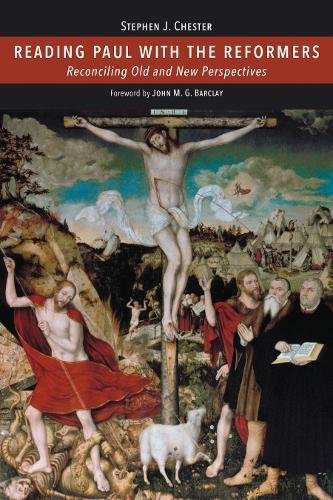Ben. Because of the medieval Catholic theology of ‘merit’ an awful lot of energy is expended by these Reformers on refuting the idea that our good works earn merit, or that anything we could do could fall into the credit category in so far as it could contribute to our salvation or justification. The problem with this is that the NT says nothing about merit, and it says quite a lot about rewards for good works (e.g. 1 Cor. 3). This whole idea of rewards ‘in heaven’ or the eschaton, with salvation not being viewed as a reward itself, comes up a lot in early Judaism, as Chad Thornhill shows, and in the NT. Do you think that the Reformers ‘protesteth too much’ when it comes to the issue of merits, or are over-reacting to the theology they grew up with? How does that sort of focus and repeated denial skew the way they view of Paul, or does it? Take for instance the example you cite on p. 309. Calvin is so wanting to deny anything meritorious in a good work, that he says the work is rewarded just because God loves worker, not because of the quality of the work. Yet this is just the opposite of what Paul says about the work of ministers in 1 Cor. 3— those who build with precious stones get the reward, those who build with hay etc. will be lucky to escape through fire. Calvin seems rather clearly off base here, and out of touch with the early Jewish discussions about rewards (see both Sanders and Thornhill). Also, why would Christ’s righteousness need to cover for the imperfections of our good works? Can’t their shortcomings simply be dealt with by divine forgiveness and compassion? Why drag the imputed righteousness into this discussion when Paul doesn’t?
Stephen. I take us today to be in a very different context from the sixteenth century and so revival of a polemic against merit might not be especially helpful now. Nevertheless, I am in fundamental agreement with them on this issue. I take their basic point to be the incommensurability of divine holiness and human calculations about merit. Even in theologies that propose that God graciously accords to human deeds a worth far beyond their actual worth, there is still a calculation of relative achievement. Calvin’s point in rejecting this is, I think, not that God rewards the work just because God loves the worker, but that it is not what we achieve (which will always be pitiable when measured by divine standards) that counts and is valued by God but rather our affection and willingness to obey. Human reciprocity matters, and God rewards the right use of God’s gifts of grace, but this is more like living into an inheritance to which one is already the heir than it is like meriting something that would otherwise not be yours. It means being judged by a loving father to be ready to receive more of that inheritance. This is why adoption is a such a significant theme for Calvin.
The point about the imperfections of our good works being covered by Christ’s righteousness is not as some kind of alternative methodology to divine forgiveness and compassion but rather that for Calvin it is united by faith with Christ that God’s forgiveness is received and God’s compassion is expressed.












